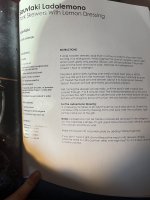k_tsoukalas
Administrator
Souvlaki is one of my favorite dishes to make (and eat)! At home, I tend to make it with boneless chicken breast, but when I go out I tend to order pork. I like to marinate the meat for at least a few hours, but I have found that overnight is best. Once it's done marinating, I add pepper and onion chunks to the skewers for extra flavor. Occasionally, I make them without the vegetables, but that is only if I don't have any on hand. The recipe from the Cooking Greek cookbook is almost identical to my method.
Check out the Cooking Greek Cookbook by Worldwide Greeks out on Hardcover, Paperback and eBook here!

Check out the Cooking Greek Cookbook by Worldwide Greeks out on Hardcover, Paperback and eBook here!




